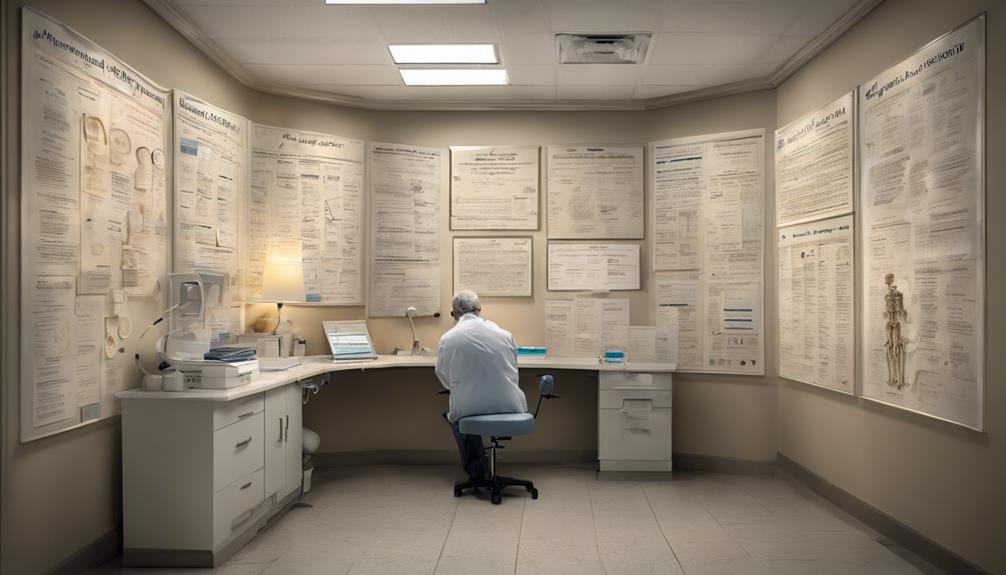When it comes to our bone health, it is important to consult with a specialist who offers personalized care and has the expertise to treat conditions such as osteoporosis. It is crucial to comprehend the intricacies of osteoporosis treatment and how it affects our overall health in order to properly maintain our well-being.
But how do we navigate the realm of specialists and find the right fit for our needs? Let's explore the world of doctors specializing in osteoporosis and discover the key factors that can guide us towards optimal bone health and vitality.
Key Takeaways
- Consult primary care for referrals to specialists.
- Specialists like endocrinologists and rheumatologists focus on osteoporosis care.
- Lifestyle changes and medications are key in treatment.
- Methodist West in Houston offers comprehensive osteoporosis care.
Specialists in Osteoporosis Care
When seeking specialized care for osteoporosis, individuals can turn to experts such as endocrinologists, rheumatologists, geriatricians, gynecologists, and orthopedic surgeons for tailored treatment and management.
Endocrinologists specialize in metabolic bone diseases and hormone-related conditions, making them well-equipped to address osteoporosis stemming from hormone imbalances.
Rheumatologists excel in diagnosing and treating various bone, joint, and muscle disorders, including osteoporosis, ensuring comprehensive care for patients.
Geriatricians focus on managing osteoporosis in older adults, offering specialized treatment plans that cater to the unique needs of seniors.
Gynecologists play a crucial role in addressing osteoporosis concerns in women, particularly related to menopause and reproductive health.
Orthopedic surgeons, on the other hand, may be involved in cases requiring surgical interventions for bone fractures or severe osteoporosis.
Together, these specialists form a multidisciplinary team capable of providing comprehensive care for individuals dealing with osteoporosis.
Choosing the Right Healthcare Provider

To select the right healthcare provider for osteoporosis care, begin by consulting your primary care provider for an evaluation and potential specialist referrals. Your primary care provider can assess your condition and recommend specialists such as rheumatologists, endocrinologists, gynecologists, geriatricians, physical therapists, or orthopedic surgeons who specialize in osteoporosis treatment. These specialists can offer personalized care and expertise in managing osteoporosis.
If you need help finding knowledgeable healthcare providers for osteoporosis management, consider visiting the Bone Health & Osteoporosis Foundation website, which can assist in locating suitable professionals. Physical therapists can also play a crucial role in your treatment plan by teaching exercises to enhance bone density and improve daily activity safety for individuals with osteoporosis. Rheumatologists and endocrinologists, in particular, are well-equipped to diagnose and treat osteoporosis, providing specialized care tailored to address the unique challenges of this condition.
Osteoporosis Diagnosis and Treatment Options
Upon receiving an osteoporosis diagnosis, healthcare providers typically conduct a bone density scan, such as a DEXA scan, to evaluate bone health and assess fracture risk. Treatment options for osteoporosis may include medications like bisphosphonates, hormone therapy, and denosumab, aimed at slowing down bone loss and reducing fracture risk. In addition to medication, lifestyle changes are crucial in managing osteoporosis. These changes may involve engaging in weight-bearing exercises, ensuring adequate calcium and vitamin D intake, and implementing fall prevention strategies to maintain bone health.
Healthcare providers involved in the treatment of osteoporosis can vary and may include primary care providers, rheumatologists, endocrinologists, and geriatricians, depending on individual needs. Early diagnosis and intervention are essential in preventing complications like fractures and improving overall bone health. By seeking timely medical care and adopting appropriate treatment strategies, individuals can better manage osteoporosis and reduce the risk of fractures.
Finding a Doctor With Osteoporosis Expertise

After receiving an osteoporosis diagnosis, finding a doctor with expertise in osteoporosis is crucial for effective management and treatment. When seeking a healthcare provider with osteoporosis knowledge, consider the following steps:
- Consult Primary Care Providers: Start with your primary care doctor for initial evaluation and potential referrals to specialists who focus on osteoporosis care.
- Specialists in Osteoporosis: Endocrinologists, rheumatologists, geriatricians, family doctors, and gynecologists possess expertise in diagnosing and treating osteoporosis.
- Physical Therapists for Bone Health: Physical therapists can design exercise regimens to enhance bone density and improve daily activities for individuals with osteoporosis.
- Utilize Referral Resources: Websites like the Bone Health & Osteoporosis Foundation can aid in locating healthcare providers well-versed in osteoporosis treatment.
Osteoporosis Specialist in Houston, TX
Houston Methodist Hospitals in Texas feature specialized healthcare professionals who focus on managing and treating osteoporosis effectively. In Houston, TX, individuals seeking an osteoporosis specialist can find expert care at Methodist West. These specialists, including geriatricians, endocrinologists, and rheumatologists, offer comprehensive services to diagnose, treat, and prevent complications related to osteoporosis.
Patients can benefit from board-certified experts who can perform bone density tests and develop personalized treatment plans to manage osteoporosis effectively.
Frequently Asked Questions
What Is the Best Doctor to Treat Osteoporosis?
When treating osteoporosis, it's crucial to consult the most suitable doctor. Specialists like endocrinologists, rheumatologists, geriatricians, and gynecologists are well-equipped to address specific aspects of the condition. Primary care providers also play a vital role in screening and initiating treatment for osteoporosis.
Each specialist brings unique expertise to the table, ensuring comprehensive care for individuals managing osteoporosis. Consulting the right doctor can lead to better outcomes and improved bone health.
What Do You Call a Doctor Who Specializes in Osteoporosis?
When it comes to osteoporosis, a specialist who focuses on this condition is commonly referred to as an endocrinologist or a rheumatologist. These doctors have expertise in managing hormonal imbalances affecting bone health and diagnosing bone, joint, and muscle disorders, including osteoporosis.
Seeking care from these specialists is crucial for effective management of osteoporosis and reducing fracture risks. It's essential to consult with an endocrinologist or rheumatologist for comprehensive osteoporosis care.
Should I See an Endocrinologist for Osteoporosis?
Yes, we should consider seeing an endocrinologist for osteoporosis. They specialize in managing bone health, offering comprehensive evaluations and personalized treatment plans.
Endocrinologists focus on metabolic disorders and bone density issues, making them well-equipped to address osteoporosis. By working closely with patients to monitor bone health and adjust medications, they can help prevent complications and reduce fracture risk, leading to better management of the condition and improved quality of life.
What Do Most Doctors Prescribe for Osteoporosis?
Most doctors prescribe bisphosphonates as the first-line treatment for osteoporosis to slow down bone loss and reduce fracture risk. Hormone therapy, like estrogen or selective estrogen receptor modulators (SERMs), may also be recommended for postmenopausal women to help maintain bone density.
Denosumab, a biologic medication targeting bone-resorbing cells, is another common prescription. Calcium, vitamin D supplements, and teriparatide for severe cases are additional treatments to support bone health.
Conclusion
In conclusion, when seeking care for osteoporosis, it's crucial to find a doctor with expertise in this condition. By choosing the right healthcare provider, individuals can receive proper diagnosis, treatment, and guidance to improve bone health and overall quality of life.
Don't hesitate to reach out to specialists in osteoporosis care, as they play a vital role in managing this condition effectively. Choose wisely, prioritize your health, and take proactive steps towards better bone health.









